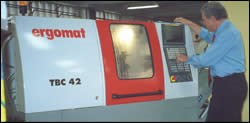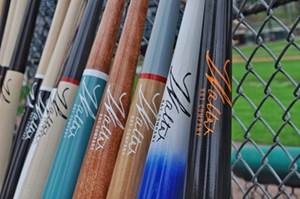Staking A Claim In the CNC Multi-Slide Niche
The new TBC 42 multi-slide automatic turning machine by Brazilian machine-tool builder Ergomat may be made in South America, but its target market is clearly Western Europe and North America.
The new TBC 42 multi-slide automatic turning machine to be introduced by Brazilian machine-tool builder Ergomat may be made in South America, but its target market is clearly Western Europe and North America.
In late May, two working prototypes were operational in time to be included in Ergomat’s booth at São Paulo’s machinery show, Mecânica 2004. But instead, they sat in the builder’s nearby factory showroom, awaiting transport to their debuts at Metav in Düsseldorf and at IMTS in Chicago.
The soon-to-be introduced single-spindle design uses a sophisticated GE Fanuc 18iTB to simultaneously control eight axes. The 7 1/2-kW machine with 42-mm bar capacity (60-mm optional) is deemed just a bit too upscale for the local market, where other Ergomat automatics do very well.
The new TBC 42 lathe will start shipping in November. It is built for a niche market, explains Ergomat Director and President Andreas Meister. He believes there are two ways for a world-class machine-tool builder to survive in a location like Brazil, which he describes as “off the beaten path.” The first is to try to sell to large multinationals, and the second is to aim your best product at a focused segment of the market. “The niche needs to be big enough to support a technically competitive enterprise,” he notes, “but not too big so as to attract the 600-pound gorilla” as a competitor.
With the new CNC automatic, Ergomat will be looking to serve its established customer base in European countries such as Germany, France, Italy and Sweden, where labor costs are high and the workforce is well trained. In those places, as well as in the United States, says Mr. Meister, there will always be a demand for locally produced, high-quality turned parts. “Big companies seldom machine their own small turned parts because, in general, these components have low overall value to the completed product,” he says. “So it’s cheaper to have specialized companies nearby produce those parts.”
In Mr. Meister’s view, those specialty screw machine parts suppliers squarely describe the niche market he’s aiming at with a machine that will carry a price tag of about $130,000. They must react quickly to their large customers’ demands and produce tight-tolerance pieces in batches from 300 to 15,000 pieces.
Not For The Local Market
Ergomat’s tradition of exporting goes all the way back to its founding 42 years ago as a Traub subsidiary, supplying its German parent with component parts. A tour of the factory in the outskirts of São Paulo gives the impression of a mature German facility, which in many ways, it is. When Traub first outfitted the plant in the 1960s, a guiding concern was that the installation be relatively self-sufficient. One reason was that it was at the end of a long supply line from Europe. Another, perhaps more important, reason was that Brazil’s then-military government imposed severe restrictions on importing sophisticated machine components such as CNCs in order to nurture a home-grown electronics industry (that policy backfired and was finally rescinded 15 years ago).
So Ergomat built Brazil’s first CNC machine tool—a 1979 Maho UF-11 universal milling machine, which Traubomatic was producing under license at the time, equipped with a locally built computer numerical control. The first model was retained at the factory, where it remains in production today. In addition, the Brazilian plant built German SHW milling machines under license, and approximately 800 mills were built there before the authorizing agreements ran their course.
Today Ergomat imports machine tool parts in probably the same ratio as most other world-class builders—some signature items, such as spindles ground on Voumard and Schaudt machines, will always be produced locally. But the tradition of self-sufficiency remains, and it bolsters a significant aspect of the company’s business: repair parts.
Ergomat maintains records and production capability for 30,000 items, of which 18,000 are in active inventory. These include parts for all machines that have been built there, including Traub, SHW and Maho models. An adjunct business is rebuilding, specializing in restoration of 20-year-old Traub CNC machines with Traub CNCs made by Mitsubishi.
Cam-Controlled Automatics Are Bread And Butter
Still, the central business of Ergomat, in terms of unit volume, remains very similar to what led to its founding. “Program number one is cam-controlled automatics like the A 25 lathe,” explains sales director Alfredo Ferrari, who has been with Traubomatic/Ergomat since 1971. The dedicated 1.5-kW machine, which also comes in a 15-mm capacity version, is deemed one of the most successful machine designs in the world and is produced at a volume of 300 units per year. The TD and TB Series cam-controlled automatic lathes are also included in that program. These more powerful (2.2-kW and 4.3-kW, respectively), larger (to 36-mm and to 60-mm bar capacity, respectively) are single-spindle machines with four cross slides and six turret stations. Mr. Ferrari compares them to cam-operated screw machines like the famous Brownies from Brown & Sharpe.
Program number two for Ergomat is the CNC multi-slide automatics, such as the four-cross slide TDA and TBA models equipped with locally produced controllers. The soon-to-be-introduced TBC lathe is an extension of that product line.
The third production program is a range of slant-bed CNC universal lathes made for the domestic market and equipped with Fanuc or Siemens controllers. They were introduced in the 1990s and modernized this past year with introduction of a new hydraulic turret. Sales of those machines to Brazilian customers are supplemented by imports: Ergomat holds the exclusive rights to locally represent Star Micronics multi-spindle screw machines from Japan and Hardinge machining centers from the United States.
As important as the entire family of products are to the Brazilian machine tool producer, most eyes at the company are now focused on its newest baby, the computerized TBC 42 destined for that IMTS unveiling. It’s key that it become competitive in the market and generate revenue in the future. It’s perhaps even more vital that it become accepted as a contender and thus cement Ergomat’s future as a major—if far-flung—player in the 21st century screw machine business.
Joe Jablonowski is editor of Metalworking Insiders’ Report, Gardner’s subscription newsletter for CEOs in the machine-tool industry.
Related Content
Getting More Production From Swiss Turning Centers
Buying a new CNC Swiss turning center is a substantial investment. For the best return, look closely for capabilities that enable the best utilization of the machine.
Read MorePursuit of Parts Collector Spearheads New Enterprise
While searching for a small parts accumulator for Swiss-type lathes, this machine shop CEO not only found what he was looking for but also discovered how to become a distributor for the unique product.
Read MoreVideo: Why a Production Machine Shop Started a Baseball Bat Company
A 153-year-old manufacturer of precision, metal pins recently started a side business creating custom wooden baseball bats. The reasoning behind establishing this new company is intriguing, as is how it has helped create a stronger bond with the local community.
Read MoreAutomation Breakthroughs Revolutionize Precision Machining for Complex Parts
Marubeni Citizen-Cincom delivers custom solutions to address some of the biggest challenges in precision machining from handling small parts, to robot integration and unique tooling needs.
Read MoreRead Next
Do You Have Single Points of Failure?
Plans need to be in place before a catastrophic event occurs.
Read MoreA Tooling Workshop Worth a Visit
Marubeni Citizen-Cincom’s tooling and accessory workshop offers a chance to learn more about ancillary devices that can boost machining efficiency and capability.
Read More5 Aspects of PMTS I Appreciate
The three-day edition of the 2025 Precision Machining Technology Show kicks off at the start of April. I’ll be there, and here are some reasons why.
Read More












.jpg;maxWidth=300;quality=90)









